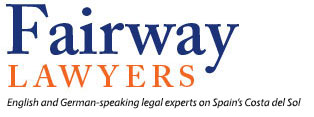Notaries may refuse deeds if it is not clear where the cash has come from (Ignacio Lillo)
Some owners, selling before the deeds are registered, do not want their names to appear on the paperwork to avoid paying taxes.
The new Tax Fraud Prevention Law, which came into force in December, requires all parties and payments to be identified.
What were once commonplace tax evasion tricks during the sale of a property are now more and more difficult.
The Notaries’ offices in Malaga are starting to register cases in which transactions are interrupted as one or more of the parties refuses to identify the means of payment or even for their names to appear on the paperwork. It is normally the developers or even the banks who ask to review the operation as they think they may be leaving themselves open to problems with the taxman.
Public Notary and local delegate of the Official School of Notaries, Joaquín Mateo, offers the following example of the cases that throw up most question marks when it comes to the sale of a property, especially following the introduction of the new Tax Fraud Prevention Law that came into force last December 1st.
“The developer A sells a flat to private individual B who in turn transfers it to a third party C. The real estate firm receives 100,000 euros from B who still owes 80,000. B agrees to sell the property to C by means of a sales contract, in exchange for a sum that covers the amount already paid plus an extra 10,000 euros profit. Then C agrees to pay A the 80,000 euros still owed and takes out the mortgage”. This is the technique known in Spanish as “dar el pase”, which can generate huge profits for investors.
This normally works well but problems arise when B, who bought the property off plan and hopes to sell before the keys are handed over and the deeds are drawn up, does not want his name to appear on the paperwork to avoid paying taxes. But the firm is obliged to name the first buyer.
As Mateo explains: “It’s impossible for the first buyer to disappear because he made a payment to the developer which has to be identified. The developer could be considered to have collaborated in the tax fraud and face criminal charges. The new law makes these transactions much more difficult and I have heard that the clauses that permitted them are being taken out of private contracts.
The senior member of the School of Notaries, Granada-based Andrés Tortosa, admits that in his offices he had also come across this type of case.
“The seller does not want his name to appear and so problems arise. This is the intention of the new law, to control this type of tax free revaluation”.
Tortosa points out that these transactions have to be registered and seven per cent is payable in tax. Furthermore the seller’s income has to be declared on the year’s income tax returns form and is subject to between 20 and 30 per cent in capital gains tax, which significantly reduces the profit margin.
Notaries explain that an immediate consequence of the new law will be a slump in the investment market. Marcial Bellido, the director of the Business Practice Institute (IPE) and expert in the real estate market, adds that the law will help make operations more transparent and reduce tax fraud. He does, however, break a lance in favour of the investors: “They buy when the property does not yet exist, something others do not want to do; they get in first and then sell on to someone who has the advantage of seeing the completed property. The same thing happens on the stock exchange; we shouldn’t criticise the speculator”.
However at the same time he admits that this practice encourages inflation within the sector, creating a “stock of housing that is not used”. As far as prices are concerned he considers that the decrease in demand could lead to a slight reduction, pointing out that 20 per cent of all purchases are as investments. “Now people aren’t buying so merrily”.
Black money
José Antonio Pérez, a teacher in the Real Estate Market section of the IPE, is more critical.
He believes that the law has come late in the day and fails to solve the main dilemma, that is, the existence of black money.
“This is the main problem of the real estate market and the law can do little when it comes to contracts between private individuals”.
In his opinion the serious developers were already prohibiting the transfer of contracts before the deeds are registered.
“The prices are causing the resale of properties to disappear in Malaga. Today’s cases are just the tail end of the trend”.
The Notaries themselves admit that it is difficult to control pacts between private individuals to hide money. All both parties need to do is stipulate a price to put on the title deeds and hand over the rest of the amount “under the table” to reduce tax.
Mateo adds: “We ought to be asking why there is so much fraud. Taxes are very high and sometimes the amount payable crosses the line between being able to buy a property or not”.
He calls for the State’s extra income resulting from the increased control over fraud to go towards reducing taxes for buyers and sellers in the lower income brackets.

